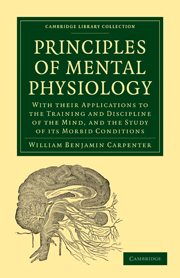 Principles of Mental Physiology
Principles of Mental Physiology Book contents
- Frontmatter
- PREFACE
- Contents
- BOOK I GENERAL PHYSIOLOGY
- BOOK II SPECIAL PHYSIOLOGY
- CHAPTER X OF MEMORY
- CHAPTER XI OF COMMON SENSE
- CHAPTER XII OF IMAGINATION
- CHAPTER XIII OF UNCONSCIOUS CEREBRATION
- CHAPTER XIV OF REVERIE AND ABSTRACTION:—ELECTRO-BIOLOGY
- CHAPTER XV OF SLEEP, DREAMING, AND SOMNAMBULISM
- CHAPTER XVI OF MESMEBISM AND SPIRITUALISM
- CHAPTER XVII OF INTOXICATION AND DELIRIUM
- CHAPTER XVIII OF INSANITY
- CHAPTER XIX INFLUENCE OF MENTAL STATES ON THE ORGANIC FUNCTIONS
- CHAPTER XX OF MIND AND WILL IN NATURE
- APPENDIX. DR. FERRIER'S EXPERIMENTAL RESEARCHES ON THE BRAIN
- INDEX
CHAPTER XVIII - OF INSANITY
Published online by Cambridge University Press: 29 August 2010
- Frontmatter
- PREFACE
- Contents
- BOOK I GENERAL PHYSIOLOGY
- BOOK II SPECIAL PHYSIOLOGY
- CHAPTER X OF MEMORY
- CHAPTER XI OF COMMON SENSE
- CHAPTER XII OF IMAGINATION
- CHAPTER XIII OF UNCONSCIOUS CEREBRATION
- CHAPTER XIV OF REVERIE AND ABSTRACTION:—ELECTRO-BIOLOGY
- CHAPTER XV OF SLEEP, DREAMING, AND SOMNAMBULISM
- CHAPTER XVI OF MESMEBISM AND SPIRITUALISM
- CHAPTER XVII OF INTOXICATION AND DELIRIUM
- CHAPTER XVIII OF INSANITY
- CHAPTER XIX INFLUENCE OF MENTAL STATES ON THE ORGANIC FUNCTIONS
- CHAPTER XX OF MIND AND WILL IN NATURE
- APPENDIX. DR. FERRIER'S EXPERIMENTAL RESEARCHES ON THE BRAIN
- INDEX
Summary
550. From the condition, of temporary derangement of the functional action of the Brain, which results from the presence of poisons in the Blood, we pass to that in which the derangement is persistent. Between the state of the well-balanced Mind, in which the habit of Self-control has been thoroughly established, so that its whole activity is directed by the Moral Will of the Ego,—and that of the raving madman, whose reasoning power is utterly gone, who is the sport of uncontrollable passion, and is lost, to every feeling of affection, of right, and even of decency,—vast as the interval may seem, there is an insensible gradation. For, as has been heretofore more than once remarked, there are many individuals abroad in the world, who are so much more governed by Impulse than by Reason, that they can scarcely be accounted as altogether sane; whilst there are many others, who knowingly surrender the control which they originally possessed over their course of thought and action, to the domination of a fixed idea, which gradually acquires a complete mastery over them (§ 561). It is not the purpose of this Treatise, however, either to discuss the general subject of Insanity, or to attempt to draw the line which separates it from Sanity,—which is no more possible scientifically (though usually not difficult in practice), than to draw a definite line between bodily health and disease.
- Type
- Chapter
- Information
- Principles of Mental PhysiologyWith their Applications to the Training and Discipline of the Mind, and the Study of its Morbid Conditions, pp. 657 - 675Publisher: Cambridge University PressPrint publication year: 2009First published in: 1874


